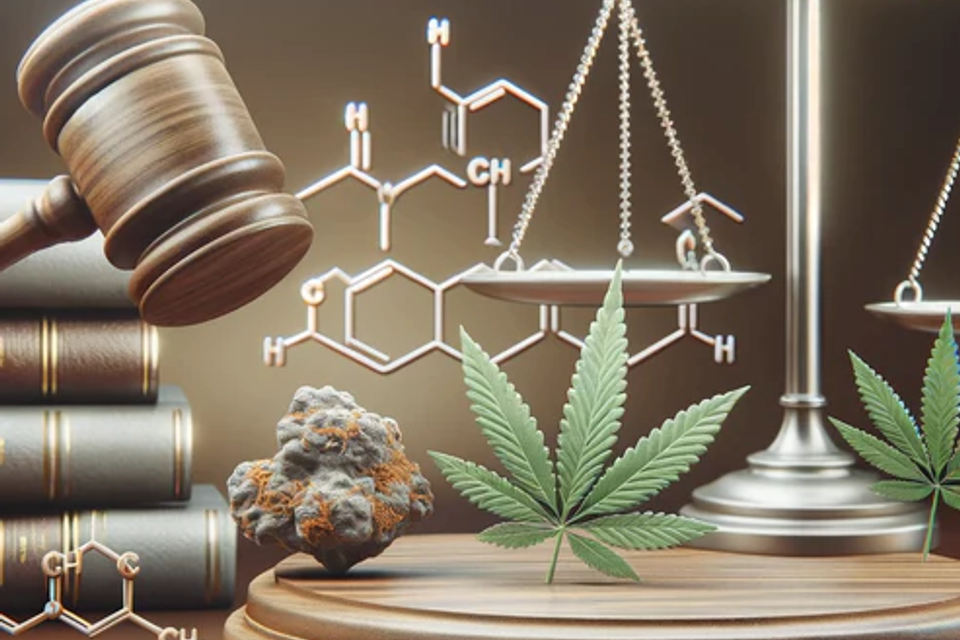
Tetrahydrocannabinolic acid (THCA) is a non-psychoactive compound found in raw and live cannabis. As the precursor to THC (tetrahydrocannabinol), THCA transforms into THC when exposed to heat, a process known as decarboxylation. This transformation is crucial in understanding the legal status of THCA. In its raw form, THCA has gained attention for its potential therapeutic benefits, separate from the psychoactive effects of THC.
The legal status of THCA is complex and intertwined with the regulations surrounding cannabis and its derivatives. While THC is a controlled substance under federal law, the legal interpretation of THCA's status requires a deeper understanding of both cannabis legislation and the specifics of THCA's chemical properties.
The federal legal landscape for cannabis and its derivatives, including THCA, primarily revolves around the Controlled Substances Act (CSA) and the 2018 Farm Bill. The CSA categorizes THC as a Schedule I substance, which denotes a high potential for abuse and no accepted medical use. However, THCA in its raw, non-psychoactive form is not explicitly mentioned in the CSA.
The 2018 Farm Bill, on the other hand, legalized hemp — cannabis with less than 0.3% THC on a dry weight basis — and its derivatives. This legislation opened a legal pathway for hemp-derived products, including those containing THCA, as long as the THC threshold is not exceeded. This distinction has led to a gray area in the legality of THCA, depending on its source and concentration of THC post-decarboxylation.
The primary legal ambiguity surrounding THCA stems from its transformation into THC upon heating. Products containing THCA, if heated or aged, could potentially exceed the 0.3% THC threshold, thereby crossing into illegal territory under federal law. This scenario creates a challenge in regulating and enforcing laws around THCA-containing products.
Moreover, the state-level legal status of cannabis varies significantly, with some states having legalized cannabis for medicinal or recreational use, while others adhere strictly to federal guidelines. This patchwork of state laws further complicates the federal legality of THCA, as products legal in one state might be illegal in another.
For consumers, the legal ambiguity of THCA means exercising caution, particularly when traveling between states or ordering products online. It is essential to be aware of both federal and state laws regarding cannabis and its derivatives.
For the cannabis industry, this legal gray area presents both challenges and opportunities. Businesses must navigate complex regulations while also exploring the potential of THCA in the burgeoning market of non-psychoactive cannabis products. As laws evolve, the industry might see clearer guidelines and more extensive research on THCA and its uses.
Is THCA legal under federal law?
THCA is in a legal gray area under federal law. While not explicitly illegal, its transformation into THC, a controlled substance, upon decarboxylation raises legal complexities, particularly regarding products that might exceed the 0.3% THC threshold set by the 2018 Farm Bill.
How does the 2018 Farm Bill impact the legality of THCA?
The 2018 Farm Bill legalized hemp and its derivatives with less than 0.3% THC. This law suggests that hemp-derived THCA products are legal as long as they don't surpass the THC threshold upon usage or processing.
Can THCA products be legally transported across state lines?
The transport of THCA products across state lines falls into a legal gray area. While hemp-derived THCA might be federally legal, varying state laws and the potential for THCA to convert into THC make interstate transport legally risky.
Are there any therapeutic benefits of THCA?
THCA has been studied for its potential therapeutic benefits, which are distinct from the psychoactive effects of THC. However, more research is needed to fully understand its medical applications.
How do state laws affect the federal legality of THCA?
State laws on cannabis and its derivatives vary widely, affecting the federal legality of THCA. In states where cannabis is legal, THCA might also be legal. However, in states adhering to federal guidelines, THCA's legal status is more uncertain.
The legal status of THCA is complex and intertwined with the regulations surrounding cannabis and its derivatives. While THC is a controlled substance under federal law, the legal interpretation of THCA's status requires a deeper understanding of both cannabis legislation and the specifics of THCA's chemical properties.
Federal Legislation and THCA
The federal legal landscape for cannabis and its derivatives, including THCA, primarily revolves around the Controlled Substances Act (CSA) and the 2018 Farm Bill. The CSA categorizes THC as a Schedule I substance, which denotes a high potential for abuse and no accepted medical use. However, THCA in its raw, non-psychoactive form is not explicitly mentioned in the CSA.
The 2018 Farm Bill, on the other hand, legalized hemp — cannabis with less than 0.3% THC on a dry weight basis — and its derivatives. This legislation opened a legal pathway for hemp-derived products, including those containing THCA, as long as the THC threshold is not exceeded. This distinction has led to a gray area in the legality of THCA, depending on its source and concentration of THC post-decarboxylation.
The Legal Gray Area of THCA
The primary legal ambiguity surrounding THCA stems from its transformation into THC upon heating. Products containing THCA, if heated or aged, could potentially exceed the 0.3% THC threshold, thereby crossing into illegal territory under federal law. This scenario creates a challenge in regulating and enforcing laws around THCA-containing products.
Moreover, the state-level legal status of cannabis varies significantly, with some states having legalized cannabis for medicinal or recreational use, while others adhere strictly to federal guidelines. This patchwork of state laws further complicates the federal legality of THCA, as products legal in one state might be illegal in another.
Implications for Consumers and the Cannabis Industry
For consumers, the legal ambiguity of THCA means exercising caution, particularly when traveling between states or ordering products online. It is essential to be aware of both federal and state laws regarding cannabis and its derivatives.
For the cannabis industry, this legal gray area presents both challenges and opportunities. Businesses must navigate complex regulations while also exploring the potential of THCA in the burgeoning market of non-psychoactive cannabis products. As laws evolve, the industry might see clearer guidelines and more extensive research on THCA and its uses.
FAQs
Is THCA legal under federal law?
THCA is in a legal gray area under federal law. While not explicitly illegal, its transformation into THC, a controlled substance, upon decarboxylation raises legal complexities, particularly regarding products that might exceed the 0.3% THC threshold set by the 2018 Farm Bill.
How does the 2018 Farm Bill impact the legality of THCA?
The 2018 Farm Bill legalized hemp and its derivatives with less than 0.3% THC. This law suggests that hemp-derived THCA products are legal as long as they don't surpass the THC threshold upon usage or processing.
Can THCA products be legally transported across state lines?
The transport of THCA products across state lines falls into a legal gray area. While hemp-derived THCA might be federally legal, varying state laws and the potential for THCA to convert into THC make interstate transport legally risky.
Are there any therapeutic benefits of THCA?
THCA has been studied for its potential therapeutic benefits, which are distinct from the psychoactive effects of THC. However, more research is needed to fully understand its medical applications.
How do state laws affect the federal legality of THCA?
State laws on cannabis and its derivatives vary widely, affecting the federal legality of THCA. In states where cannabis is legal, THCA might also be legal. However, in states adhering to federal guidelines, THCA's legal status is more uncertain.


